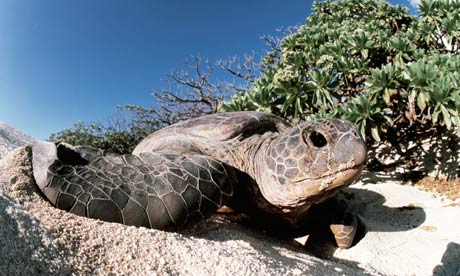• Kenya Wildlife Service (KWS) says: "Leave only footprints in the sand and air bubbles in the water."
• Don't dispose of litter in the sea (or anywhere else other than a bin). It's illegal and dangerous to marine life. Turtles mistake clear plastic waste for jellyfish and can die if they eat it.
• Don't buy products that have been made from sea turtle parts. Guitars, ashtrays, jewellery and other products made from sea turtles are sold to tourists around the world.
• Help the recuperation process for thousands of sick and injured turtles by funding their rehabilitation, or sponsor a turtle or a nest.
• Don't support beachfront shops that are built illegally. By law, permanent structures cannot be built within 60 metres of the high-water mark. Report illegal activities and bad beach operators.
• Try to stay in resorts that have responsible beachfront management practice – for example, banning bright lights that face the beach and can confuse nesting turtles, or keeping all beach furniture behind the high-water mark so that is does not present obstacles for turtles.
• Don't drive motorised vehicles on the beach. Compacted sand from vehicle use makes it hard for turtles to dig nests.
• Research marine tour operators and don't use those that disturb or harass wildlife such as dolphins.
• Avoid restaurants that serve undersized crabs and lobsters as this contributes to the species' demise.
• Don't buy shells or other marine products as this encourages the destruction of the beaches and reefs. The areas outside marine parks are threatened by excessive shell collection. Empty shells provide homes for hermit crabs and some fish.
• Snorkelling and diving are encouraged but under the supervision of KWS wardens who work closely with local tour operators and hoteliers to ensure strict adherence to the marine willdife code. Always check your operator.
• Don't remove, damage or touch corals. They are living organisms that take years to grow and support many species.
• Don't use flippers near corals as disturbed sand can choke the animals.
• Don't remove or collect fish, shellfish or coral from the marine park. It's illegal and will disrupt the ecosystem.
• Don't fish in the national park. It's is illegal, because parks provides a safe haven for fish stocks to breed.
• Hook and line fishing is allowed in marine reserves but prohibited in parks. Spear guns are not permitted in either.
• Write to the Ministry of Tourism, your country's ambassador to Kenya, KWS and the National Environment Management Authority to highlight any environmental problems you encountered while travelling. Report any infringement of the rules to park rangers or the managers of the hotel where you are staying.
• If you're visiting coastal forests, keep to designated tracks and paths. Take away all the litter brought with you. Don't feed wild animals or risk fires. Don't take away animals, animal products, plants or plant parts.
• In addition to the environmental considerations, don't sunbathe naked or topless as the east African coast is a predominantly Muslim area. Dress modestly outside the beach areas.
• Jessica Aldred's trip was funded by Turtle Bay and Kenya Airways











